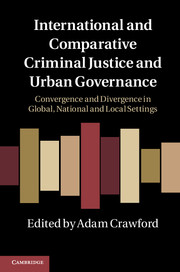 International and Comparative Criminal Justice and Urban Governance
International and Comparative Criminal Justice and Urban Governance from PART 1 - International criminal justice
Published online by Cambridge University Press: 05 June 2011
The eyes of victims of past crimes and of the potential victims of future crimes are fixed firmly upon us.
Kofi Annan opening the ICC Rome ConferenceIntroduction
Those who would like to see the international criminal trial remain a retributive endeavour reflecting the conventional features and characteristics of domestic trials are concerned that enhancing victim constituency for the international trial process will endanger its limited potential success (Judah and Bryant 2003). Some critics declare that the International Criminal Tribunal for the former Yugoslavia (ICTY) in particular has achieved legitimacy through the effective prosecution of significant offenders important to many victim communities (Findlay and McLean 2007). In this, it is argued, lies sufficient justification for the expansion of a retributive international trial process in the form of the International Criminal Court (ICC). In addition, the disclosure debacle around the first ICC indictment, which clearly divided the interests of the prosecutor and of victims heightens the challenges to conventional trial positioning if victim interests are given standing.
Despite such narrower legalist assertions the ICC, and its prosecutor, have claimed more universalist justifications in the form of the court's potential to assist in state reconstruction and peacemaking. Further, the ICC and the international tribunals which precede it have within their authorising legislation growing recognition of victim interests, even if this remains largely outside the processes of trial decision making.
To save this book to your Kindle, first ensure [email protected] is added to your Approved Personal Document E-mail List under your Personal Document Settings on the Manage Your Content and Devices page of your Amazon account. Then enter the ‘name’ part of your Kindle email address below. Find out more about saving to your Kindle.
Note you can select to save to either the @free.kindle.com or @kindle.com variations. ‘@free.kindle.com’ emails are free but can only be saved to your device when it is connected to wi-fi. ‘@kindle.com’ emails can be delivered even when you are not connected to wi-fi, but note that service fees apply.
Find out more about the Kindle Personal Document Service.
To save content items to your account, please confirm that you agree to abide by our usage policies. If this is the first time you use this feature, you will be asked to authorise Cambridge Core to connect with your account. Find out more about saving content to Dropbox.
To save content items to your account, please confirm that you agree to abide by our usage policies. If this is the first time you use this feature, you will be asked to authorise Cambridge Core to connect with your account. Find out more about saving content to Google Drive.